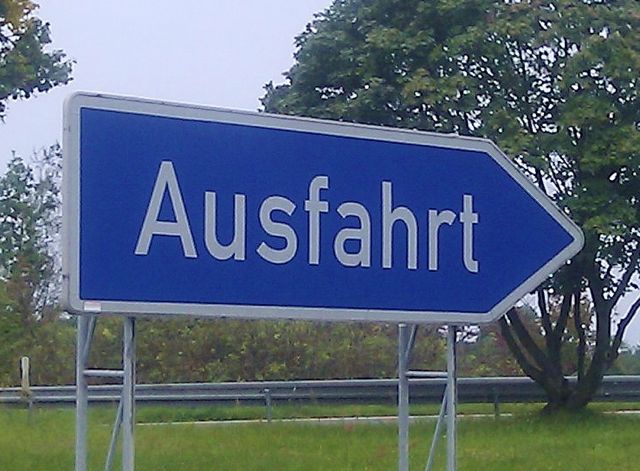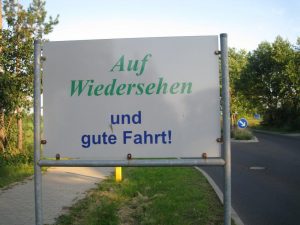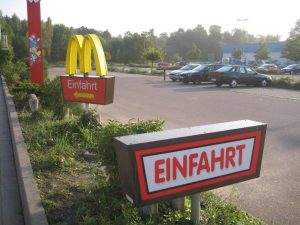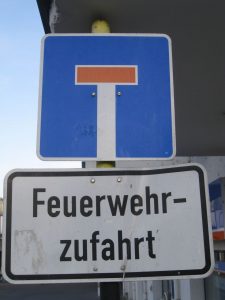How to Fahrt in German

If you’ve ever been on a German Autobahn, you’ve seen this sign:
To English speakers it is a funny word that sounds a lot like the English word fart.
Now…what exactly does the German word “Ausfahrt” have to do with the English meaning of “fart”?
To be exact … nothing.
However it has everything to do with the German love for making new words by simply putting together existing words.
A Ride Through German Wordland
“Ausfahrt”, the German word for exit, is a combination of two words: “aus”, meaning out of, and “Fahrt”, meaning journey or drive.
If you’d like to wish someone a pleasant journey, you say, “Auf Wiedersehen und gute Fahrt”.
If you translated each word literally it would mean, “To again-seeing and good journey.”
What it really means is “Good-bye and have a good trip.”
Pretty logical, if you ask me: you’re driving out of something, so the “drive-out” is called Aus-Fahrt.
You might be thinking that you could Aus-Fahrt from this page and try a free practical German lesson too, but your German teacher would definitely have a better suggestion for how to say that.
Einfahrt to McDonalds
Now that you know the word “Fahrt” you can use it for other combinations as well:
The “Einfahrt” is a combination of “ein”, meaning “in” or “into”, and — “Fahrt”, you guessed it. Any clue what an Einfahrt is, then? Right, an into-drive, literally, or an entrance.
Pedestrians Never Einfahrt
On a side note, “Ausfahrt” and “Einfahrt” can only refer to exits and entrances for vehicles. “Fahrt” means “drive” or “journey”, so only vehicles which can be driven (or ridden, such as a bike, a bus, a train, etc.) can drive into or out of the Ausfahrt or Einfahrt.
An example of the word “Ausfahrt” used in a sentence could be the following:
Die Ausfahrt ist links. The exit is left. The exit is on the left-hand side.
Nimm diese Ausfahrt! Take this exit!
Die Ausfahrt ist eng. The exit is narrow.
Solving the German Language Word Puzzle
The German language is basically a big word puzzle. But once you understand that big long scary looking words are usually combinations of short simple words that you already know, the German word puzzle gets a lot easier.
If you take the simple word “Fahrt” and add different prefixes, you get all kinds of fun signs. Take a look at this sign: Feuerwehrzufahrt. That means firebrigade entrance and yes it’s really all one big word. However if you start taking the word apart it’s simple.
Let’s start with the bottom part of the word. Zufahrt is a composite of the puzzle pieces „zu“ and „Fahrt“, „zu“ meaning „to“. A “Zufahrt”, therefore, is the way to something. Obviously feuerwehrzufahrt literally would literally translate as “Firebrigade to ride or journey.”
Now that you know the word “Fahrt“ and its derivatives you’ll be a better driver in Germany and German train travel will be easier as well.
Abfahrt is made up of “ab” and “Fahrt”. By now you know what Fahrt means. “Ab” is the German word for “off”: The departure, or “off-drive”, literally, is the time when the train takes off. Isn’t German wonderfully logical?
The Precise German Language
Germans are exact (or so we like to say), and our language is exact as well. That’s why we have specific words for things other languages have to describe with complete sentences.
Instead of saying “the way there”, for example, we piece together the preposition “hin”, which means “to, towards, there” and the word “Fahrt” and get, voilà, “Hinfahrt”, literally, “to-drive”, or the way there. One word instead of three!
You probably figured by now that there’s a word for the way back as well: It’s “Rückfahrt”, “rück” being a short form of “zurück”, which means back, and our old friend “Fahrt”, once again.
To say you’d like a single ticket (not a round trip) in German, you’d say to the ticket agent: “Nur die Hinfahrt, bitte”. Literally this translates as, “Only the there-drive, please.” and it really means, “I only want a one way ticket please.”
Of course, you can piece together different nouns as well:
Radfahrt – a composite of “Rad” (bike) and “Fahrt” (journey), “Autofahrt” – consisting of “Auto” (car) and “Fahrt” (drive), “Bahnfahrt” – puzzled together out of “Bahn” (train) and “Fahrt” (journey). I’ll stop here, but the list goes on.
And all this with one simple word that sounds funny to most English ears: “Fahrt”.
Big German Words are Made From Little German Words
The German love for precision and word combining can get out of hand though. There are words that seemingly stretch over a whole page. To give you an example:
Fahrt. (drive/journey)
Schifffahrt. Schiff (ship) + Fahrt (drive/journey) = shipping
Binnenschifffahrt. Binnen (inside) + Schiff (ship) + Fahrt (drive/journey) = inland navigation
Binnenschifffahrtsstraßen. Binnen (inside) + Schiff (ship) + Fahrt (drive/journey) + Straßen (streets) = inland waterways
Binnenschifffahrtsstraßenordnung. Binnen (inside) + Schiff (ship) + Fahrt (drive/journey) + Straßen (streets) + Ordnung (order) = traffic regulations for inland navigation
Binnenschifffahrtsstraßensordnungsparagraf. Binnen (inside) + Schiff (ship) + Fahrt (drive/journey) + Straßen (streets) + Ordnung (order) + Paragraf (paragraph) = paragraph in the traffic regulations for inland navigation
Having fun yet? That’s German for you! It’s very exact.
The good news is that the really big words are almost always combinations of little words which makes learning and understanding them a LOT easier.
Do You Want to Learn German?
If you are planning on traveling to Germany or if you are already in German, you will definitely have a LOT more fun if you can speak at least a little German.
This German learning program is very good at getting you conversational basics very quickly.

 Login
Login


Absolutely wonderful. Besides the laughs about “fahrt”–as inspired by the new roller coaster at Busch Gardens Williamsburg Va called “Verbolten”– I actually learned a lot about the German language in just a little space.
Lets’ see now. Verboten is a German word that means something like, “It’s strongly forbidden.” Sounds like a good name for a roller coaster!
The running joke in Germany was to ask American newcomers if they had been to the town of Ausfahrt yet. It’s easy to find-there are exits leading to it all over the Autobahn.
That’s pretty good! When I was in Germany it took me some time to figure it out.
Wish I had found this website before traveling to Germany last fall. We traveled the autobahn extensively and had a good laugh. Absolutely a beautiful people and country! Will definitely go again!
Karen –
Glad to hear you have fun in Germany. It’s quite a lovely place, is it not? Make sure to brush up on your German lessons before going again.
Thomas
So funny to read this. My 9 year old son and I are in Germany and have been laughing all week about the various types of farht, so this is very timely!
We just got back from Germany. It was out 1st family vacation over there, rented a car. We got a kick out of all the ‘Ausfahrt’ signs.
Joe –
Thanks for sharing! How were your language skills? Are you ready for a return visit soon?
Thomas
Thomas, are you the author? If so, thank you! I enjoyed it a lot. To anyone else who enjoyed it, I recommend an article by Mark Twain, The Awful German Language.
Read a little 19th century German first to understand what he says about German sentences in newspapers.
Ed –
I am not the author. The author of almost (if not) every blog article is the inventor and lead designer of the software Language101.com offers.
Many thanks for the excellent excerpt of Mark Twain’s! Certainly his wit and humor about learning German can be appreciated by all who have studied German in depth.
Thomas
During my years working for VW I always loved the German words on the ignition switch Start Fahrt and Garage this of course was not on the imported cars for sale in USA, I spoke and read some German and understood the meanings
Thanks for your comments about “Start Fahrt”. We should ask some Germans what things make them laugh about the American Language.
Currently I’m living in Australia. But once I come home again I’ll prblaoby move to Saarbruecken. That’s pretty much the same area as Kaiserslautern I think it’s quite nice because neither the sea nor the mountains are too far away and you are close to France.But what’s so hilarious about Ausfahrt and Einfahrt ? Sounds perfectly normal to me :D
Hi Karmen, You must be German or Austrian, am I right?
In American slang (and perhaps British slang too) the word for the sometimes bad smelling wind that sometimes comes out of your but is “fart”. This is the short informal word that most people use. The medical term for the same thing is flatulence. People who are trying to be very polite might say, “pass wind.”
So when an American or an Aussie, visits a German speaking country and sees all these sings reminding him, that it is “time to fart” it just seems naturally funny.
What’s the German informal word for flatulence?
Lots of fahrting around in Germany and Austria for sure. The actual word for “fart” in German is “Furz”. Not too different from our word.
Ron,
My wife,our 3 Children and I are from Australia and we were travelling in our campervan along a German motorway. We saw a series of Ausfaht signs we had quite a great laugh thinking talking about us and our habits.
Just returned from 12 days in Zurich and Germany visiting seeing the Christmas Markets, churches, and camps. I figured out the einfarhts and ausfarhts pretty quickly while picking up my rental car. I thought I would make up my own German word: einausfarht. Or if you had too much kraut, brats, and gluhwein then you use the word zweiausfarht. My wife was not amused.
Funny! My daughter is in the Army in Germany. She sent me a T shirt that says:
“Where the heck is Ausfahrt Germany?”
My german skills aren’t bad for someone who’s never been there (somewhat better than “KinderDeutch”). I immediately started laughing! Funniest shirt I’ve ever owned!
We were stuck behind a smelly diesel engine on a two-lane mountain road. The sign on the bus made it tolerable (funny): “Touristfahrt”
In Austria the exits were named “ausgang”. What is the difference? Same language.
The German verb “fahren” means to drive, and you do it in or on some kind of vehicle. The journey you make with a vehicle is called a “Fahrt”, hence Ausfahrt and Einfahrt. But if you’re in foot you’re not driving but walking. The verb for this is “gehen”, and the relevant noun is “Gang”. So if you’re going in or out if somewhere on foot the signs will say “Eingang” and “Ausgang”. If you want to say you’re going somewhere by bus, you’ll always say “mit dem
Bus fahren”, never “gehen”. German is indeed a very precise language.
Thank you. This was great info, since I had asked Siri multiple times for a definition, but(!), ‘she’ kept replying “I’m not able to translate to English yet”…Tho, in that phraseology it appears she is working on it…And from the polite humorous info at this site (I tricked her with another combo of questions and got right here) , I’m presuming she’s secretly working on her own, on a bratenshtuffer (sp., sorry) and a lowenbrau in der back room, and I may get wind of her reply…later.
Germany IS beautiful, as is much around Munich…sigh(‘burp’).
Thank you, again!
Quent